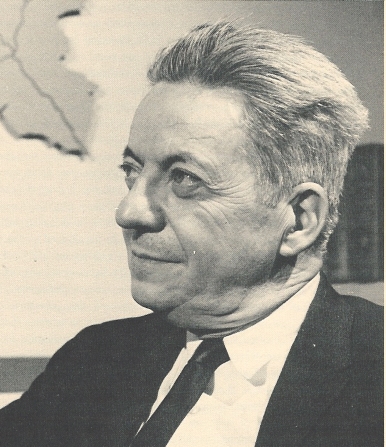Frederick L. Zimmermann
July 1906 - December 1993

- Native of Brooklyn, New York.
- Elected to the New York Assembly at age 22, where he served six terms. He introduced the resolution that led to the formation of the Joint Legislative Committee on Interstate Cooperation, which was the vehicle used by New York State for its part in the founding of the Council of State Governments.
- Joined the political science department at Hunter College in 1936. He served as chairman of the department from 1959 to 1968. (Zimmermann continued to be active with the Joint Legislative Committee on Interstate Cooperation, where he served 27 years as the research director for the interstate cooperation committee.)
- Is credited as one of the key participants in forming the Interstate Commission on the Delaware River Basin during the 1940s.
- In 1951, co-authored an authoritative manual on the subject of interstate compacts.
- Initiated the formation of the Susquehanna River Basin Compact. (During a meeting of the National Council of State Legislators in the winter of 1960 and 1961, Zimmermann suggested to a Pennsylvania legislator, Harris Breth, that the Susquehanna Basin would be a logical candidate for a federal-interstate cooperative agreement, similar to that of the Delaware Basin.)
- Served as chairman of the Susquehanna River Basin Compact Drafting Task Force from 1964 to 1967.
Recipients of the Frederick L. Zimmermann Award
2010: U.S. Congressman Tim Holden (Pennsylvania District 17)
Congressman Holden was recognized for his work toward the restoration of federal funding in fiscal year 2009 for the Commission as well as the Delaware and Potomac River Basin Commissions. He was also instrumental in the passage of the 2007 Farm Bill that contained stronger conservation provisions in support of agriculture, the Susquehanna Basin, and the Chesapeake Bay.
2007: Pennsylvania Representative Jerry Stern (District 80)
Representative Stern was recognized for his commitment to watershed management, his unwavering support of the Commission’s water resource management activities, and his leadership for an appropriation to enable projects intended to compensate for consumptive water use by farmers in the Pennsylvania portion of the Susquehanna River Basin. One of those projects, the Barnes and Tucker Mine Water Treatment Project, will also improve water quality in the West Branch Susquehanna River.
2005: U.S. Senator Barbara A. Mikulski (Maryland)
Senator Mikulski was recognized for her many accomplishments and contributions in the area of watershed management. She was successful in her efforts to restore federal funding for the Susquehanna Flood Forecast and Warning System. In her capacity as ranking member of the Senate Commerce, Justice, Science and Related Agencies Appropriation Committee, she effectively championed this cause for fiscal year 2006.
2001: New York State Senator John R. Kuhl (District 52)
Senator Kuhl was recognized for his outstanding leadership in the New York State Senate in promoting interstate cooperation and watershed management, protecting the Upper Susquehanna and Chemung River Watersheds, and enhancing the regions’ economic development.
2000: Maryland Delegate David Rudolph (District 34B)
Delegate Rudolph was recognized for his outstanding leadership in the Maryland House of Delegates in protecting the Lower Susquehanna River watershed by bringing to the forefront issues affecting this region, including debris and sediment management and flood and drought management.
1998: Pennsylvania Representative Russell H. Fairchild (District 85)
Representative Fairchild was recognized for his leadership in promoting the water resource values of the Susquehanna River and Chesapeake Bay Watersheds and fostering interstate legislative cooperation. Among his many legislative accomplishments, he formed the Susquehanna Caucus in the Pennsylvania General Assembly and initiated the first basinwide Susquehanna legislative summit.
1996: U.S. Congressman Sherwood L. Boehlert (New York State District 23)
Congressman Boehlert was recognized for his outstanding leadership in the U.S. Congress in promoting environmental laws and renewing the commitment of the 104th Congress to environmental protection. Among his many legislative accomplishments, he led efforts to strengthen the Clean Water Act Reauthorization Bill to include wetlands protection and nonpoint source pollution abatement. He also later authorized a legislative initiative to undertake a comprehensive watershed management study for the upper Susquehanna Basin.